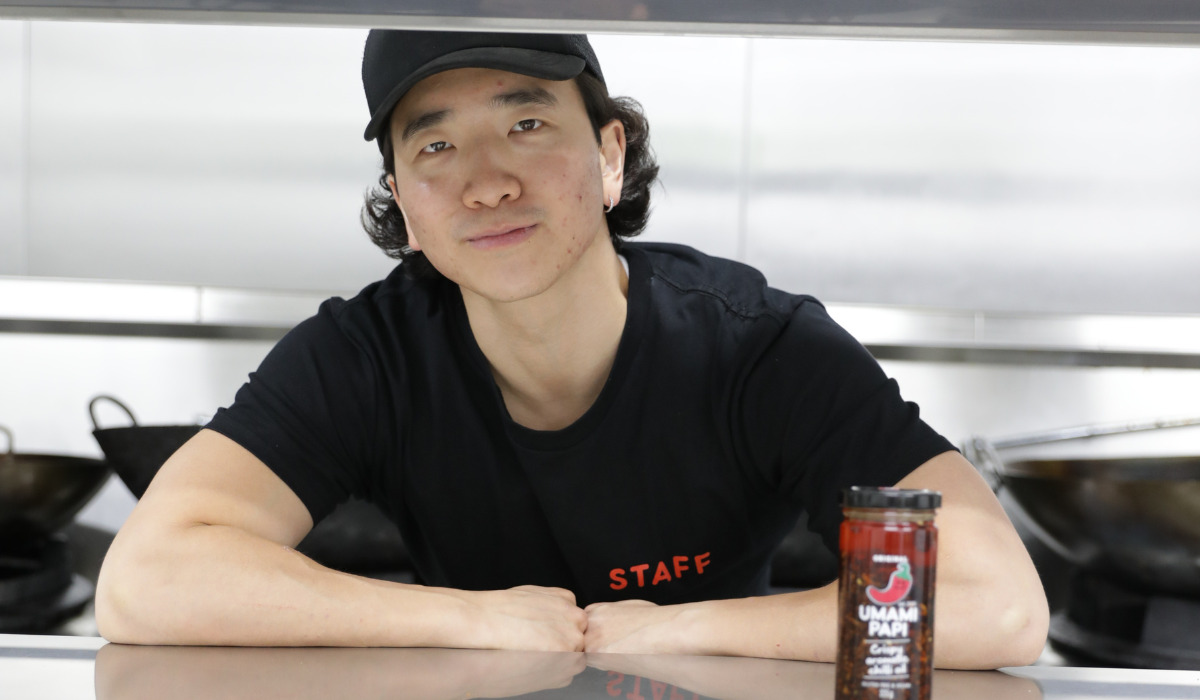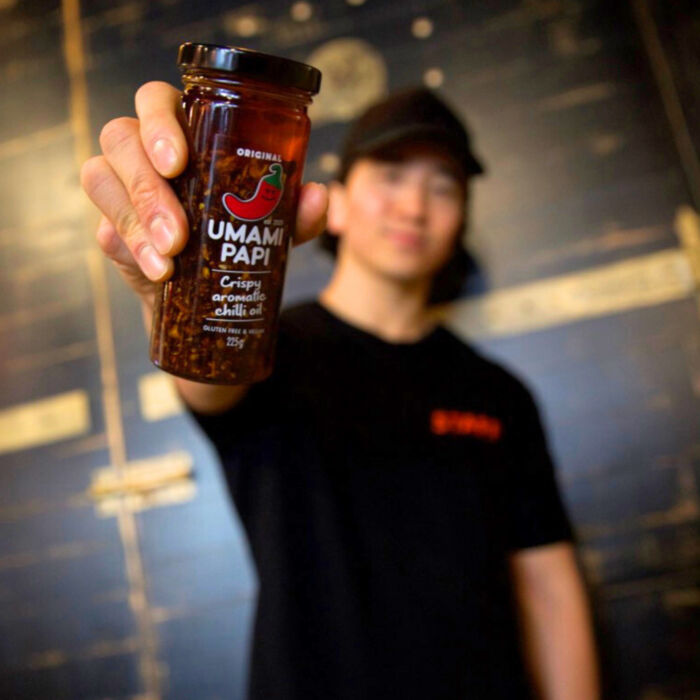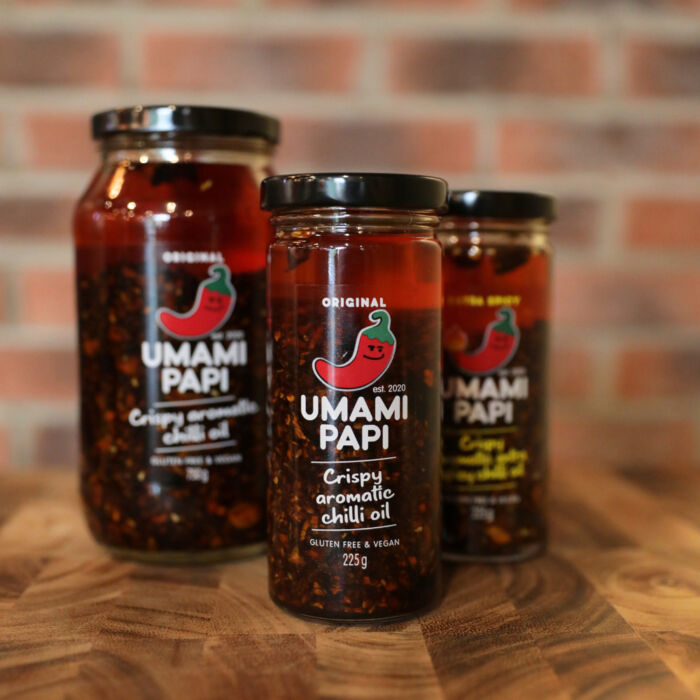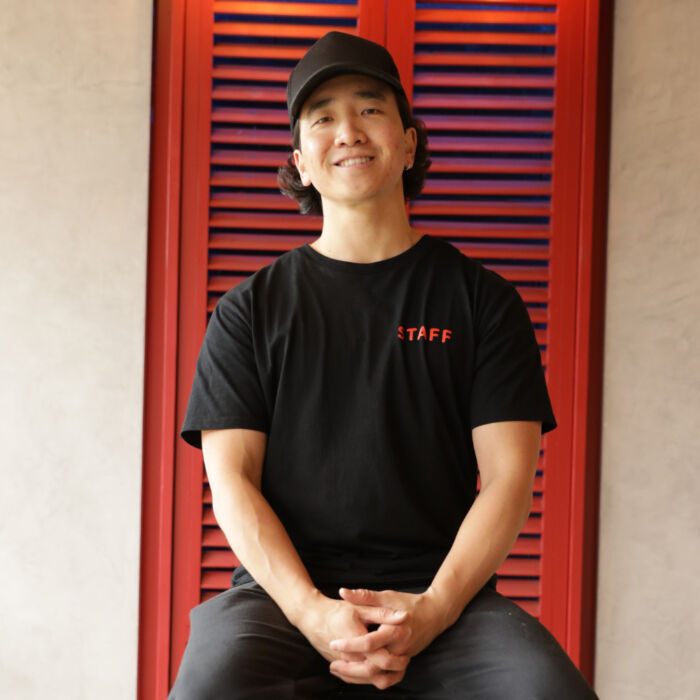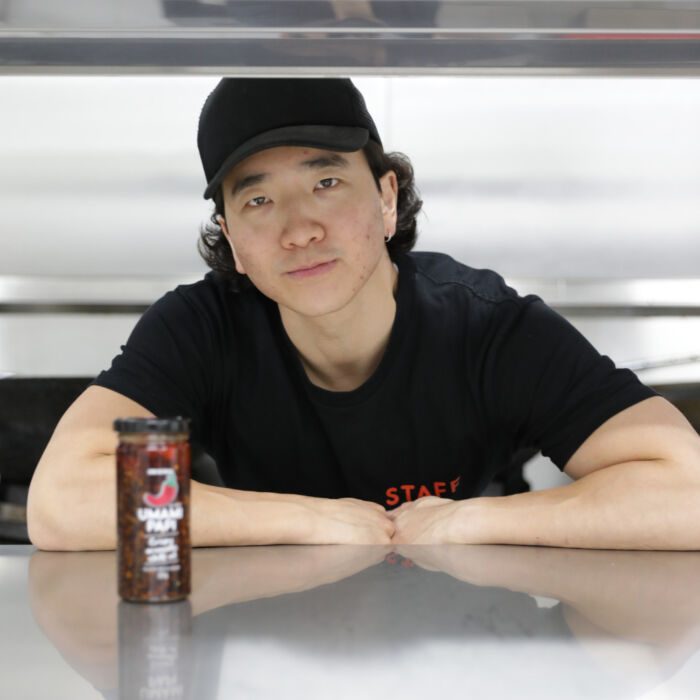Foundr’s Little Empires series uplifts the stories of everyday entrepreneurs building better futures for themselves and their customers. We talked with Ethan Yong, founder and CEO of the social-sensation chili oil brand UmamiPapi.
—
Ethan Yong started his business because of a DM.
Yong was a graduate student working at a prestigious financial firm when he began intensely making chili oil in his tiny kitchen. Then, he started giving his homemade recipe to family and friends while perfecting the formula with their feedback.
One day, while scrolling his Instagram feed, he saw a friend post about an off-the-shelf chili oil. So Yong messaged him and asked why he bought chili oil when he could have grabbed a free jar from his homemade batches.
“And he goes, ‘Yeah, but this one looked really good. Why don’t you do it? Why don’t you try and sell it?’ And that message was enough for me to go, ‘You know what, maybe I will,’” Yong says. “And that’s how it all started.”
Within two years of brewing flavors in his cramped apartment, Yong has built his chili oil startup, UmamiPapi, into business with thousands of customers worldwide. The chili oil is now stocked in stores across Australia, including retail giant Coles.
But UmamiPapi didn’t go from broken burners and DMs to industrial kitchens and retail orders just because of its delicious flavors. Instead, Yong says it was a decision to sacrifice plans for a purpose.
Keep Learning: How This Founder’s SEO Strategy Saved His Ecommerce Business
Fire in the Belly
Yong grew up loving spicy food. At age five, his mother teased him into dipping his tongue into the fire.
“My mom was like, “Look, if you don’t start eating spicy food now, you’re going to miss out on a lot of foods when you’re older,” Yong says. “And for some reason, in my five-year-old brain, I knew I’d be missing out.”
At university is when Yong first tried to make chili oil. He says those first batches were simple and didn’t have any of the subtleties that the UmamiPapi recipe has today—but the period allowed him to experiment without the pressure of customer demands.
After school, Yong began his graduate finance job remotely, and because of the lockdown period in 2020, he naturally continued his hobby of perfecting his chili oil formula. Yong says what separates UmamiPapi’s oil is its ingredients–crispy garlic, onion, shallot, mixed with three different chilies–and flavor profile that focuses on taste rather than spice.
“I was cooking it out of there for fun, sharing it on my personal Instagram and kind of getting friends and family to try it out.”
Yong says, “I would share this feedback and re-share the stories they’d post on my Instagram.”
Following the direct message conversation with his friend, Yong started selling his oil via Instagram.
“I’d had this fire in my belly to just want to make the best chili oil, and that was enough,” Yong says. “[Just because of] those few words that he said over an Instagram DM.”
The fire grew.
Soon, strangers started messaging Yong asking for the oil. Without a proper setup, he made transactions by messaging bank information back and forth, all while cooking on falling-apart stoves with barely any room to store jars of chili oil.
“To tell you the truth, I didn’t think I’d start a proper business,” Yong says. “[I thought] maybe I’ll get a bit of pocket money. If I can make like a grand, I could buy a new guitar or something. I wasn’t thinking big picture.”
Leaving Safety for Sensation
When the raving reviews for the oil started pouring in via social media, Yong realized Umami Papi was more than a hobby.
“Two months after I started for fun, that’s when it became a bit more serious,” Yong says. “At that point, I didn’t really have a plan. I didn’t have any structure, and I didn’t think that we’d be in national supermarkets in less than two years.”
In 2021, he started working in person at his day job, meaning he couldn’t check on the simmering sauces between Zoom meetings.
“I spent a whole weekend cooking and jarring while working my nine-to-five on Monday to Friday,” Yong says. “I was like, ‘Man, I can’t keep doing this cooking at home.’”
So, he rented a commercial kitchen, hired a staff, set up a Shopify store, and registered the business. Leaving his home kitchen paid off. Soon, he was racing to keep up with demand, working nights and weekends while managing the products, staff, and shipping.
“Having to do stuff for Umami while commuting to the office, coming back home exhausted from mentally looking at spreadsheets all day, it takes a toll on your brain power.”
Sitting in his office cubicle, Yong would pop in AirPods and listen to The Foundr Podcast with Nathan Chan.
“Being a solo founder, you know there’s gonna be some tough times,” Yong says. “I took a lot of inspiration from all of the podcasts that I listened to that Nathan would share.”
The stories of founders leaving their full-time jobs and wholly committing to their businesses kept motivating Yong.
“I’ve got an UmamiPapi spreadsheet open while doing my actual work,” Yong says about sitting in his cubicle. “And I’m listening to [The Foundr Podcast], and I’m going like, ‘How do I leave? How do I quit?’”
Yong’s manager understood his dilemma. He’d brought samples of UmamiPapi into the office and got orders from team members. People knew the speed at which the business was growing.
“I worked so hard to get into the graduate program, and I went to uni, and I had this whole map of my career trajectory,” Yong says.
“You need a bit of naivety and a bit of willpower to get over it and go, ‘Let’s just take the risk.’”
With support from his manager and team, Yong left his nine-to-five to pursue Umami Papi full-time.
In the two years since Yong left his career in finance, UmamiPapi’s brand continues to engulf customers on social and in stores. Intending to bring the most versatile chili oil on the market, Yong is working on expanding the brand’s global reach into North America while maintaining the quality that separates UmamiPapi in the condiment market.
“I may not be changing people’s lives in the way other companies do for philanthropic reasons,” Yong says. “But, I think I’m improving the way people enjoy their meals. And that on its own is quite special.”
